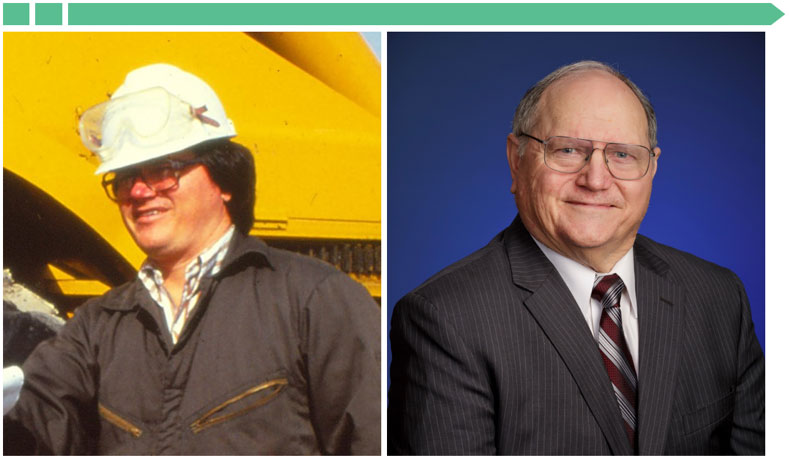#FLASHBACKFRIDAY – Future Leaders Look Back on the 1970s
August 3, 2018
by Future Leaders Brandon Mabile and Eric Moore (Communications Team)

As we approach the ECC Annual Conference, we are reflecting on the magnitude of reaching the 50th Anniversary of the ECC Conference. The Future Leaders Communications Team seeks to help the ECC community reflect on the significant events that have impacted our industry over the past five decades, and to do this, we will leverage perspectives from industry leaders who have pioneered the way to today. As Future Leaders, we recognize that we have a great deal to learn from the past, and plenty to be excited about as we take the reins and become the leaders of the future. Join us over the next five weeks as we look back on the past five decades, one week at a time. Each post will feature a brief interview with industry leaders who were active during those decades.
The 1970s saw great change in our industry and around the world. OSHA and the EPA both came into existence early in the 70s, forever changing the way construction was done. The energy crisis of the 70s created new boom towns in the oil patch, and started the U.S. on a path to energy independence that we are finally seeing today. Elvis passed away, the Beatles broke up, but new genres like Rap, Punk, and Disco all came into the mainstream. In the theaters, movies like Star Wars, Jaws, and The Godfather would influence cinema for decades to come.
This week’s contributors are Emmitt Nelson and Jimmy Slaughter, two men who share the honor of being recipients of the ECC Achievement Award, and who also happen to share a friendship for over thirty years. We had a chance to ask them a few questions about the industry in the 1970s.
Emmitt Nelson was the ECC Achievement Award Winner in 2013. He is based in Houston, and is still actively consulting to the industry. Currently 88 years old, he retains his licensed P.E. and mentioned on the phone that promoting industry safety is his “ministry”. His full bio can be found at http://www.nelsonconsulting.com/about-us. A quick online search will show you that he has made (and is still making) significant contributions to the improvement of our industry’s safety culture in a wide variety of publications, articles, and best practices over his long and prolific career.

One of Mr. Nelson’s most notable industry contributions was when he was retained by Shell Oil Company in 1990 to Chair the "Zero Accidents Task Force" of the Construction Industry Institute (CII) located at The University of Texas. Through research, this Task Force determined the unique safety management techniques successful contractors and owners use in the construction industry to achieve Zero worker injury. Emmitt has continued to analyze the research data and uses this information to lead his clients into new realms of excellence in safety performance.
James G. Slaughter, Jr., is also a past recipient of the ECC Achievement Award in 2016. He is Chairman of the Board and CEO Emeritus of S & B Engineers and Constructors, Ltd. He received his B.S. in Chemical Engineering from the University of Houston in 1970, attended graduate school at the University of Toledo, and the Program for Management Development at Harvard Business School. Mr. Slaughter has spent his entire career at S & B, filling both engineering and construction positions. His full bio can be seen http://www.sbec.com/execmgmt.

He is an active member and past President of the National Academy of Construction; past member of the CII Executive Committee; past President of the Houston Area Contractors’ Safety Council, as well as many different leadership roles in CII and NAC.
Perhaps Mr. Slaughter’s greatest contribution to the industry is his role as a pioneer in “zero accidents” safety since 1987. S & B has been the industry leader in safety the last 20+ years, and he has freely shared S & B processes with all that were interested. S & B has also been on the forefront of craft training, offering skills upgrade training to all craft employees and has developed a program specifically designed to bring women into construction.
We asked Mr. Nelson and Mr. Slaughter a few questions about the industry and their experiences in the 1970s.
FUTURE LEADERS: Can you share a few memories from the industry in the 1970s including your work life, your assignments, company culture, etc.?
Emmitt Nelson (EN): In the early 1970s, I was the Head of Small Projects and Maintenance at Shell Oil’s Wood River, IL refinery. Manpower in my operation was ~750 Shell trades personnel in maintenance and ~250 Building Trades Union personnel in small projects. In this time, the cost of construction was rapidly increasing due to wage demands by Building Trades Unions. In response, the Business Roundtable formed the Construction Committee, chartered to be a third participant along with Contractors and Unions in the construction wage negotiation process. Fifteen years later in my career, I was named as Chair of this committee.
Jimmy Slaughter (JS): I started in engineering as a draftsman in the 1960’s and received my degree in chemical engineering in 1970. For the most part, when I did process design on a unit, I would be asked to stay on as project manager.
From the S & B website, you can read that, “S & B Engineers and Constructors, Ltd. (S & B) was founded in 1967 by Dr. W. A. Brookshire and J. G. Slaughter Sr. to provide a complete range of project services for the petrochemical, refining, chemical, midstream and power generation industries for clients throughout the globe. In 1969, S & B began providing skilled craft personnel to the industry for construction.” During the interview, Mr. Slaughter added that, “our company has always had pride in excellent work.”
FUTURE LEADERS: Can you share a memorable challenge in your early career that helped make you better?
JS: When the coastal industrial water authority built a line to bring trinity water to all the plants on the ship channel, everyone had to install or modify water treatment equipment. We worked on several. One client sent us a process spec. for a “cost plus” plant. They gave us one week to respond and said it would be nice to have a lump sum price. We jumped through hoops and gave them a lump sum and were awarded the project. It was very successful for both the client and ourselves. This experience shows what you can do if you set your mind to it.
FUTURE LEADERS: Since your career began, what within our industry culture has changed for the better? What has changed for the worse?
EN: First, I will speak on what has gotten better. From the human perspective Safety in industrial and commercial construction has markedly improved from (very) poor (OSHA was formed to assist improvement). Today, it is common to see project complete millions of hours worked with Zero (TRIR) OSHA recordable injuries. Also, there has been an improvement of owner and contractor relations with the Union Building Trades and involvement in creating more cost-effective approaches to accomplishing cost effective projects. Regarding what has gotten worse – Skilled manpower availability has become a major concern and a discussion topic on how to resolve the problem with worker immigration becoming a major issue in the USA.
JS: Better: I agree with Emmitt on the improvements made in Safety. Also, computer aided design is a huge plus. In the day of the drafting boards, T-squares, and #2 pencils, the opportunity for mistakes were rampant. Line numbers on Flow Diagrams had to be accurately transposed to Line List, Plans and Sections, Isometrics, and Spools. And when a change came along, you had to remember to change on all related documents. (What a nightmare!)
Worse: Owners’ Management - Plant managers and CEOs used to be chemical engineers and understood project dynamics. Now they are financial types that look at engineering and construction as a commodity rather than a service. Central engineering has largely disappeared. Procurement and legal largely run the show and contracts and penalty clauses are getting tougher and tougher.
FUTURE LEADERS: What advice would you give to the Future Leader community of today?
EN: Two things - First, realize that employee safety is the primary key to more cost-effective construction and profitable project outcomes. Second, know that success in safety requires a people centered management approach that ultimately enlists involved, participating and recognized workers to become enthusiastically committed co-owners of the project safety program.
JS: There is a lot of uncertainty within the ECC community regarding project execution. The answers are not in new processes and procedures; they are in understanding and applying the proper CII Best Practices.
We are thankful for the time provided by Mr. Nelson and Mr. Slaughter and their insightful comments on the 1970s. As we wrap up this Flashback Friday, we leave you with a summary of some of the key statistics and events that defined the decade.
Key Statistics:
- $/Barrel of Oil: Low -$3.39 (1970); High - $25.10 (1979)
- Minimum Wage: $1.60 (1970); $2.90 (1979)
- Average cost of a new car: $3,542 (1970); $7,100 (1979)
- US Population: 203,302,031 (1970 Census)
Key Events:
- 1970 The Environmental Protection Agency is created and the Occupational Safety and Health Act, or OSHA, is signed into law.
- 1973 Construction is completed on the World Trade Center Towers briefly becoming the tallest buildings in the world, until later that year when the Sears Tower in Chicago, IL, opened taking the record.
- 1973-74 Gasoline prices skyrocket as supplies fall in short supply, creating long lines at the pump and other National energy saving efforts.
- 1975 Microsoft is founded by Bill Gates.
- 1976 Apple Computer is founded by Steve Jobs and 2018 ECC PersepECCtives Keynote Speaker Stephen Wozniak.
- 1977 The movie Star Wars is released to great acclaim and box office success.
- 1970s The Bee Gees dominate the music charts with hits songs, including "Night Fever," "Stayin' Alive," and "How Deep Is Your Love".

